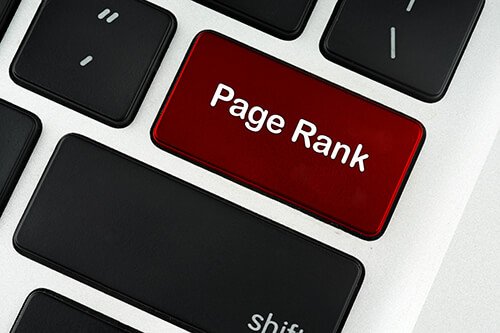
PageRank is dead: Understanding Domain Authority and Domain Rating for lawyers
Lawyers must be able to track their progress with SEO. Otherwise, investing in digital platforms can start to feel like throwing money into the black hole of the Internet with little to show for it. Google uses over 200 factors to rank attorney websites stored in its index, and 2 leading metrics that neatly combine those factors into an easily digestible score are known as Domain Authority and Domain Rank. Regardless of browser, search term, searcher, location, or device, these metrics give lawyers the at-a-glance information they need to understand how their SEO efforts are paying off.
Before we get into how these metrics work, let’s take a look at the standard they replaced: PageRank. A formula that had its name coined in Google’s infancy, PageRank still plays a foundational role in the way websites are ranked.
A brief history of PageRank
Before companies like Moz, SEMrush, and Ahrefs popped up, PageRank was one of the few reliable ways to measure the authority of a page or of an entire website. It was, and still is, largely dependent upon inbound links. PageRank is a mathematical algorithm for determining the importance of a web page on a scale of 0 to 10. It relies on the theory that pages linking to a page on the web are indicative of that page’s importance. This method for ranking web pages was developed by Google’s founders Larry Page and Sergey Brin, and it continues to influence the way Google ranks web pages.
Theoretically (and at its simplest level), the more links pointing to a page, the more important that page is.
In the early days of Google, it was easy to “game” the system by building pretty much any kind of link you wanted to. It was difficult to tell which links came from reputable and authoritative sites and which did not.
In response to poor user experience, Google continually refined its algorithm (with updates code named after animals or employees) until it was able to deliver more reliable results. The PageRank metric has remained a KPI for inbound linking, but in recent years it has become a less practical method for measuring a website’s power.
The major drawback to PageRank is that it is not updated on a regular basis by Google, let alone in real time. For lawyers trying to improve their site’s performance in search using link-building campaigns, it used to take months before they would see the increase in PageRank. Google used to update PageRank a couple of times a year. Toolbar PageRank—the PageRank that can be seen in most browser add-ons— has not been updated in a few years, and Google reports that it may not be updated ever again.
Measuring search dominance: Domain Authority and Domain Rating
Some major players in SEO analytics have emerged to help website owners track virtually every aspect of their site’s performance in search. Two of the most reliable are Domain Authority, developed by Moz, and Domain Rating, developed by Ahrefs.
Domain Authority
With tools like Open Site Explorer and Moz Local for citations, Moz is a leader in the SEO software space. Domain Authority, a metric developed by the Seattle-based company to measure the importance of a given domain, can be used to compare the ranking strength of one domain to another in search over time.
Domain Authority is a value from 0-100, and the greater your website’s Domain Authority, the more likely you are to enjoy high rankings in search. Domain Authority is computed by combining other metrics gathered by Moz on a domain—such as the number of linking root domains, the number of total links, Moz Trust, Moz Rank, etc.—into a single score.
One of the greatest things about Domain Authority is that it is updated on a regular basis (monthly along with Moz’s API) so it can measure SEO campaigns with relative effectiveness and speed. It can take months to see any kind of change in rankings on search engine results pages. By contrast, PageRank may be updated a couple times per year, so you never really know if you’re making progress or not.
Domain Rating
Domain Rating is a metric developed by Ahrefs. Like Domain Authority, Domain Rating is an assessment of the links between domains. Unlike Domain Authority however, Domain Rating does not use the same proprietary metrics used by Moz. There is not a lot of information on the web about exactly how Ahrefs calculates this metric, but the basic underlying theory is that Domain Rating is higher when a large number of high-quality root domains point to a website. Also like Domain Authority, Domain Rating is updated frequently, allowing lawyers to track the progress of their link-building activities much better than when using Google’s PageRank metric.
Search is an incredibly important part of marketing a law firm these days. Consumers are using the Internet to research and find local legal services more than ever before, and large numbers of them leverage search engines to do so. Modern metrics like Domain Authority and Domain Rating can help attorneys measure all the SEO effort they put into their websites and serve as mile markers on the road to search marketing dominance.

